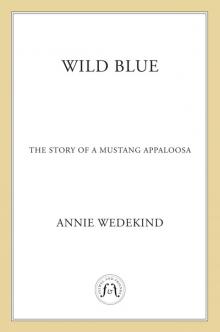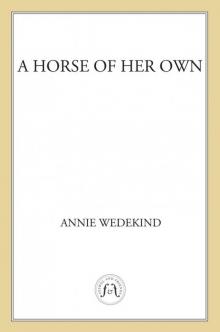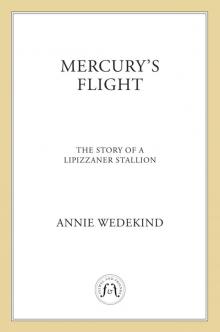- Home
- Annie Wedekind
Mercury's Flight - The Story of a Lipizzaner Stallion
Mercury's Flight - The Story of a Lipizzaner Stallion Read online
Begin Reading
Table of Contents
About the Author
Copyright Page
Thank you for buying this
Feiwel and Friends ebook.
To receive special offers, bonus content,
and info on new releases and other great reads,
sign up for our newsletters.
Or visit us online at
us.macmillan.com/newslettersignup
For email updates on the author, click here.
The author and publisher have provided this e-book to you for your personal use only. You may not make this e-book publicly available in any way. Copyright infringement is against the law. If you believe the copy of this e-book you are reading infringes on the author’s copyright, please notify the publisher at: us.macmillanusa.com/piracy.
Dear Reader,
Welcome to the Breyer Horse Collection book series!
When I was a young girl, I was not able to have a horse of my own. So, while I dreamed of having my own horse one day, I read every book about horses that I could find, filled my room with Breyer model horses, and took riding lessons.
Today, I’m lucky enough to work at Breyer, a company that is known for making authentic and realistic portrait models of horse heroes, great champions, and of course, horses in literature. This beautiful fiction series is near to my heart because it is about horses whose memorable stories will take their place alongside the horse books that I loved as a child.
This series celebrates popular horse breeds that everyone loves. In each book, you’ll get to appreciate the unique characteristics of a different breed, understand their history, and experience their life through their eyes. I believe that you’ll love these books as much as I do, and that the horse heroes you meet in them will be your friends for life.
Enjoy them all!
Stephanie Macejko
Breyer Animal Creations
CHAPTER 1
My war started, I suppose, in the spring of 1939. Of course, I did not know this at the time. I did not know that life was going to change—I was about to say forever, but the strange thing is, that isn’t true. Life did not change forever. And that gave hope to people—that some things continued, after the bombs and the tanks and the guns. Even if we were only horses.
Only horses. I can imagine what the Colonel would think of that idea. For the Colonel, the white horses of Lipizza were everything—his life, his work, his mission. Of course in the beginning, in my beginning, I did not know that such a man as the Colonel existed. His rather horselike face, with its long crooked nose, expressive eyebrows, and creases that ran in grooves down his thin cheeks, had not yet peered over my stall, a look of dismay on his face, shouting, God, Max, do something to cheer him up! It was one of the moments at Die Spanische Reitschule—or the Spanish Riding School—that I never forgot, even when home was so far away that I feared I would forget the way it smelled.
In the beginning, in my beginning and in most everyone else’s, was a mother. A mother and a place that shaped my character with equal importance. Meadowlands starred with flowers, mountain streams, apple trees, and the air as cool and fresh as the sparkling, dancing waters that fed our pasture … a heaven of horses. But if you come from such a place, how can you bear to leave? How can you bear to grow up?
It was different for me, this heaven. I experienced its beauty much as the other colts and fillies did, grazing the summer pastures, running and frisking and experimenting with our strong, young bodies. We were dark moons orbiting the white suns of our mothers, and this is where I was unlike my companions, growing up in a world next to but not the same as theirs. For my sun, my mother, was unlike the others. She did not want her dark moon. She did not want me.
My earliest memories of Mercurio, the beautiful white mare who foaled me, are indistinct, both because it was so long ago and because I did not have the cause or the urge to revisit them, until my advanced training began. I suppose the first thing I knew, and now the first thing I remember, is not her, but her absence. Among my first memories is being alone, dirty and unable to stand, in a large, dark stall, sweet smelling with hay and that clean barn dust. It was comfortable but empty, and what I wanted at that moment was to be near something, near someone, brought close and warmed. But there was nothing but the deep evening, the quiet sounds of unseen horses rustling in the adjoining stalls, the song of summer outside the doors I could not see over. I felt, unaccountably, that I had done something wrong. And though the night was mild, I was so cold.
How does a new creature, who knows almost nothing, know that something is missing? I suppose because we ache for it—for the rough, cleansing tongue, the throaty nicker of concern, the muzzle gently pushing us to our feet and toward the large, warm body and the milk it gives. Somehow, we know we need a mother, and when she does not come … well, I was going to say that we—that I—assumed it was my fault, but that feeling came later. First, the world was simply centered around a great, dark hole: my need and her absence.
It was hands—human hands—that cleaned me, warmed me, and fed me. I remember little except for the strange smells that accompanied them, how I first distrusted them and their alien scent, and then learned that these thin, upright figures with their baffling hands and their near-constant stream of foreign speech were to be my caretakers. I had yet to meet another horse. As far as I knew, I was the only one in the universe. Doesn’t every paradise contain its dark side?
* * *
My name is Favory Mercurio. It was the only one I could have, following the dictates of traditional Lipizzaner stallion nomenclature. I suppose if I had been born in another place, and my flanks did not bear the crest of Piber, I could have been Smoky or Peanut or Lucky. But I am Favory Mercurio, literally the compound of my father, Favory Toscana, and my erstwhile mother, Mercurio. I have grown into my name now, but in the beginning the people must have thought it was too big for me, for they gave me another: Pipl. It was my first caretaker, Jan, himself a very young man, who christened me. Jan fed me, groomed me, and kept me alive in the weeks before I found my surrogate mother. It seemed he was always there when I woke from my uneasy, lonely sleep, and now I see that he must have been worried indeed to spend so much time on me. The Piber nursery is a very busy place, and the grooms do not have time for babysitting. Still, there was Jan’s face, round and smiling, and his soft, measured voice, saying, “Pipl, my little chlápek,1 you must eat more, you must drink more.…”
I think I was in a sort of borderland, those first weeks. I had not fully decided to live. The world was incomprehensible and I was alone, except for Jan, and the doctor, and the other men who cleaned my stall and prodded my flanks. Why live? I existed in twilight, barely eating, barely drinking, sleeping and dreaming of I don’t know what. Jan said to the doctor, “He won’t take hold. He’s slipping away from us.” And that was exactly right.
And then one evening at dusk I was taken out of my stall for the second time. Jan tied a soft cloth about my neck and led me through the door, his arm cradled around my shoulders. I stumbled. I had not been able to walk much yet. But Jan helped me up and said encouraging things and kept moving me forward, down the corridor of the barn, toward a covered arena. Now I could see the heads of other horses in the stalls and I felt—something. Something that had been asleep quickened in me. I walked on, sniffing the air and trembling.
There, standing in the arena, tied to a post, was a sturdy white mare. As I moved unsteadily forward, I could smell her hay-sweet breath, and something else—something warm and compelling, a smell I would later think of as my first idea of home. What d
oes home mean to a horse? It means where you belong, and if you know anything about herd animals, no matter how fancily tricked up in saddles and brands and braids, no matter how individually gifted, all we really want is to know where we belong. Whether a herd, a barn, a team, or, now, a mother—we need a place in this world. And as I caught the scent of the mare, looking at me with calm interest, I let loose my first sound on earth, a plaintive sort of bleat, I’m sure, but it was a cry I could no longer contain. Mama!
She was not, of course, my mother. She was Galanta, fourteen years old, a respectable broodmare who had recently foaled. She was known for her forgiving temperament and for raising healthy colts and fillies. This was an experiment to see if she would consent to adopt me. I did not know any of this as I rushed toward her, nor did I have any idea what to do once I reached her side. But Galanta knew, and after an earnest sniffing and vigorous nudging that almost toppled me, she expertly guided my muzzle toward her belly and her milk. It was, simply, bliss. The men laughed with relief as my little bush of a tail waved madly and I grunted with happiness. For the first time, I felt like I knew what I was—a horse—and what I was supposed to do.
* * *
I had to share Galanta with her natural son, Neapolitano Galanta (otherwise known as Ned), who had been born eight weeks before me. Ned—stocky, splendidly formed, well-fed, and supremely confident—was unfazed by his sudden acquisition of a stepbrother.
“Well,” he told me when we first met, “my mother’s the best.” As if to say it would be a pity to limit Galanta’s maternal talents to merely one foal. Ned was kind to me, if a bit condescending, because he was happy and cared for, and our early years together were my first tutorial on this essential fact: How a horse acts toward others (horses, men) is often a direct reflection of how he feels about himself. It is not the self-satisfied horse that kicks or balks or bolts. It is the frightened horse, the insecure horse … the horse that could have been me had I not had Galanta, Ned, and then my great teachers.
In retrospect, having since sired foals of my own, Galanta put up surprisingly little fuss about taking on an orphaned stranger. But that was her personality—a kind of insistent competence and matter-of-factness about the world. All she told me was, “I suppose I should have let you die? Not likely, Pipl. I knew you were a fighter. But you needed a chance.” She never seemed anxious about me, or about Ned for that matter. She took it for granted that she would raise fine, strong foals, and the most she tried to impart to us, beside food and warmth and certain nuzzles when we had done something stupid and were embarrassed, was common sense. She was an aristocrat.
And it was an aristocratic setting. From the low-slung, orderly buildings with their creamy walls and ochre roofs to the magnificent Austrian landscape, lush, sloping meadows lined with upright cypresses and fringed with apple orchards, the entire Piber stud farm seemed to breathe the air of centuries, to exist outside of time. This land had seen the breeding of horses since the eighteenth century, and from empire to empire, it endured. Even early on, we colts and fillies were impressed with our fortune and the expectations it carried: This is for you, our home seemed to say. Don’t waste it.
The other horses and men gave us much the same message, in their different ways. There were rules to be followed as well as freedom to be enjoyed. After an initial, comforting confinement with Galanta and Ned, our rather unusual triumvirate was blended with the rest of the mares and foals, in a large pasture. Here we met the other colts and fillies born in our year, but I was shy then and remember mostly sticking by Ned.
Ned has always been worth sticking by. Two months my senior, he seemed older in other ways as well, or at least more impressive. I will always see him as my big brother. Black where I was brown, compact and well-muscled where I was leggy and weedy, we were as unalike as two colts could be. Here is Ned:
“Want to go look over there? Think I see a butterfly. A big one.”
Pipl: “Way over there?”
Ned: “Sure. Stay right by me. We’ll scare that old butterfly. Chase him!”
Pipl: “Seems sort of far … I don’t see a butterfly.”
Ned: “I’ll bring you right to him. You’ll touch your nose right on his wings! Stay by me.…”
And so I did. I would stay by Ned, and indeed he’d bring me to the butterfly, and I would touch its fluttering yellow wings with my muzzle, and Ned would caper after it, running surefootedly among the dips and swoops of the hills. He was always bringing me along. Until …
“Boys!”
Galanta’s neigh would ring over the fields and we would scamper home—eagerly, in my case, and reluctantly, in Ned’s.
“Aw, Mother! I almost caught that one, too!”
“With what, Ned? Your tail? Scootch, Pipl. Make room for your brother.”
And Galanta’s two dark moons would rest, side by side, in the late afternoon sunshine.
* * *
Although much was expected of us, our introduction to our world was always gentle. The men of Piber were calm, reliable people whose attitude mirrored Galanta’s. They believed in us, and unless we gave them reason to think otherwise, they assumed our good intentions and abilities. I will never forget the day we were finally separated from our mothers, when we were about six months old. Of course, I felt heartbroken and confused as we were led to a barn away from our dams, a pack of jostling, uncoordinated, desperate children crying out for the mares. The first night was especially difficult for me. My feelings of abandonment were acute—it was as if I were experiencing my mother’s rejection all over again. Galanta’s sudden, inexplicable absence seemed to call up buried memories: the flash of teeth, the furious shove, hands pulling me away … away from the mare who should want me. Shouldn’t she? It was a terrible night. I shivered next to Ned, who wasn’t much better off. But in the morning, there was Jan, as unflappable and sturdy as always, stroking our manes and speaking in his gentle drone:
“Now then, my boys, let’s have breakfast and a trot outside, and things won’t seem so bad, eh? It’s still the same old world—you’re just getting bigger.” And when I refused to follow Ned out the door, Jan seemed mildly surprised and regretful, as if he expected more from me, but oh well. It took me two hours to get my courage up to join the new herd of foals, now chasing one another in the golden autumn fields, and when I did, Jan was quietly satisfied.
“Knew you’d get there in the end, young man,” he told me confidently. “I expected no less.”
And I did always get there in the end, though by my own, slower route. It was my nature to approach new things hesitantly, and though I was still contemplating the bridle when Ned was already trotting in fluid circles from a longe line; though I stood and stared for many hours at the older colts (whose herd we joined when we were two) while my companions were eagerly joining them in mock battles and races, I did get there. And in the process, I earned a new nickname from a Viennese man observing our training: Schnecki.2
Piber was the proper place for taking one’s time. The days passed with their own rhythm, and the seasons gave a cadence to our routines … summer in the alpine mountains, running with Ned and the other stallions, winter in the Hof Wilhelm, outside the main stud, and snow days spent in group exercise in an outdoor arena. Visitors came and watched us at our work and play, men from Vienna, a place often spoken of, but never explained, itself like a dream. But there was a horizon to this gentle world—a destination that I dimly glimpsed as I learned and played and stared out toward the mountains, thinking of nothing in particular except life and grass and Ned and whether I would ever fully understand what the men wanted from us and whether it even really mattered. Perhaps this was all there was. The green world of our province, Styria, made for us. But of course, it wasn’t the end. It was only the very beginning.
CHAPTER 2
Ned was the first to point out to me that our class—the horses born in Spring 1933—were now the oldest stallions in our herd. Of course, I’d noticed the departure of our b
ig brothers—most of whom I’d avoided as much as possible, letting Ned run interference when the jostling and nipping and kicking of the near-daily social jockeying got the best of me, as it usually did. Since I bowed out of any attempt at herd dominance, happily mooning along by myself or with Ned or another low-ranked colt, I could hardly start throwing my weight around when new youngsters joined our herd. Nor did I care to. I left the new colts alone, unless they wanted to join me on a walk or a fly swish. But I never had any interest in leading or fighting. I liked to watch the men: Though familiar, they were a puzzle. I watched them with other horses; I watched them as they handled me. I thought about their voices, low and full of praise, matter-of-fact and lightly tinged with disapproval. I watched in astonishment as they rode their own horses—tall, thin bays and chestnuts that stood out from our gray-white-and-brown-mottled bunch like migrating birds visiting from another land. I thought about Galanta, whom I missed. I sometimes caught sight of her being led from the barn to the mares’ field. Sometimes she met my eye and gave me a brief whinny, but mostly she kindly ignored me, full of the fresh life growing inside her. I don’t think Ned thought of her at all.
Instead, Ned was full of plans for the future, a future that had been far from my mind.
“You know the men from Vienna are coming soon,” he told me matter-of-factly. “They’re coming to see us, just like they did with the others who have left.”
“Where did they go?” I wondered, late as always to grasp the big picture.
Ned stared at me with gentle astonishment. “To Die Spanische. Don’t you know anything?”
Well, no. I didn’t.
“They judge us,” he continued. “They take the best horses to the school, and sell the rest. Last year, Maestoso Fortuna was sent up, and our brother Conversano Galanta, and…”

 Wild Blue - The Story of a Mustang Appaloosa
Wild Blue - The Story of a Mustang Appaloosa Little Prince - The Story of a Shetland Pony
Little Prince - The Story of a Shetland Pony Samirah's Ride
Samirah's Ride A Horse of Her Own
A Horse of Her Own Mercury's Flight - The Story of a Lipizzaner Stallion
Mercury's Flight - The Story of a Lipizzaner Stallion